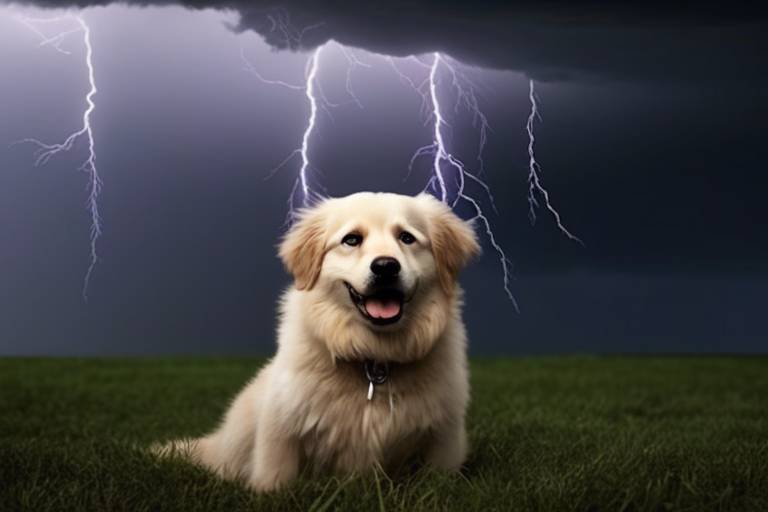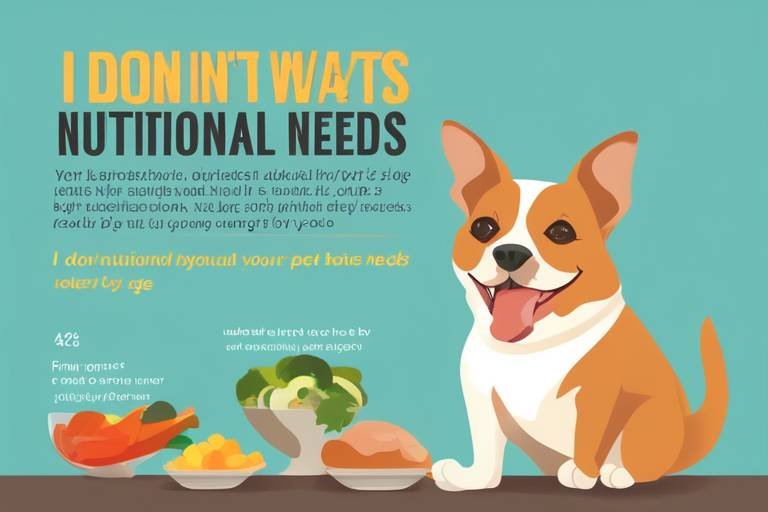How to Help Your Pet Cope with Grief
When a beloved pet passes away, it can leave a significant void not just in our lives but also in the lives of our other pets. Just like humans, animals experience grief, and they can be profoundly affected by the loss of a companion. Understanding how to support your pet during this challenging time is essential for their emotional well-being. In this article, we'll explore effective strategies to help your furry friend cope with their grief, ensuring they feel loved and supported as they navigate their feelings of loss.
Recognizing the signs of grief in pets is crucial for their recovery. Animals express their sorrow in various ways, and it's vital for pet owners to be aware of these signs. Grief in pets can manifest through changes in behavior, appetite, and overall demeanor. Just like us, pets need time to process their emotions, and as responsible pet owners, we must be attuned to their emotional needs. Think of it as being their emotional anchor during a stormy sea; your understanding and support can help them find calm waters.
Identifying the symptoms of grief can help owners understand their pet's emotional state. Grieving pets may exhibit a range of behavioral and physical changes. It's essential to differentiate between normal reactions to loss and those that may signal a more serious issue. Here are some common signs to watch for:
When pets are grieving, they may exhibit various behavioral changes. For example, they might withdraw from social interactions, showing less interest in engaging with family members or their environment. You might notice:
- Withdrawal: Your pet may prefer to be alone, avoiding playtime or cuddles.
- Changes in Appetite: Grieving pets may eat less or refuse food altogether.
- Increased Vocalization: Some pets may vocalize more as a way to express their distress.
A grieving pet may lose interest in their favorite activities, such as playing fetch or going for walks. This change can be concerning, but it's essential to monitor these shifts and gently encourage them to engage in play and exercise. Think of it as coaxing a friend out of their shell after a tough time; a little encouragement can go a long way.
Grieving pets often seek comfort from their owners. They may follow you around the house or curl up next to you more frequently. This behavior is a clear sign that they are looking for emotional support. Providing a safe and loving environment during this time is crucial. Spend extra time with them, offer gentle strokes, and reassure them with your presence. Your love can be a powerful healing force.
In addition to behavioral changes, pets may show physical signs of grief. These can include lethargy, changes in grooming habits, or even health-related symptoms. For example, a normally active dog may become sluggish and disinterested in their surroundings. It's important to keep an eye on these signs and consult a veterinarian if they persist, as they could indicate underlying health issues exacerbated by grief.
A nurturing environment can significantly aid a pet's healing process. Creating a comforting space for your grieving pet can help them feel secure and loved. Maintaining routines is also vital; pets thrive on consistency, and keeping their daily schedules intact can provide a sense of stability during a time of change.
Consistency is key for grieving pets. Keeping feeding, walking, and playtime routines can provide much-needed stability. Just like how children feel more secure with a predictable schedule, pets also benefit from knowing what to expect. This stability can help them feel more at ease as they work through their emotions.
Comfort items can be incredibly soothing for a grieving pet. Familiar toys, blankets, or even the presence of other animals can help ease their anxiety. Think of these items as a security blanket; they can provide a sense of familiarity and comfort in a time of distress. You might even consider creating a small memorial space for the pet that has passed, filled with photos and mementos, allowing your grieving pet to sense that their companion is still remembered and cherished.
In some cases, professional intervention may be necessary. If your pet's grief seems overwhelming or prolonged, it might be time to consult a veterinarian or an animal behaviorist. They can provide guidance on how to best support your pet during this difficult time and may suggest therapeutic options that can aid in the healing process.
Recognizing when a pet's grief is severe enough to warrant professional help is essential. If your pet shows signs of severe depression, such as prolonged lethargy, refusal to eat, or significant changes in behavior that last for more than a few weeks, it's time to seek veterinary support. Just as we would consult a doctor for our own health concerns, our pets deserve the same care and attention.
Various therapeutic options are available for grieving pets. These may include grief counseling, medication, and alternative therapies like acupuncture or massage. Each pet is unique, and what works for one may not work for another. It’s important to explore these options with a professional who understands animal behavior and grief.
Q: How long does a pet grieve?
A: The duration of grief can vary widely among pets. Some may show signs for a few weeks, while others may take months to adjust. Patience and understanding are key.
Q: Can pets feel the emotions of their owners?
A: Yes, pets are very attuned to their owners' emotions. They can sense sadness and may mirror that behavior, so providing a positive environment can help them cope.
Q: Should I get another pet to help my grieving pet?
A: Introducing a new pet can be beneficial for some pets, but it’s essential to wait until both you and your grieving pet have had time to heal. Rushing into this decision may cause more stress.

Understanding Pet Grief
Grief is a profound emotion that isn't just reserved for humans; our furry friends feel it too. When a beloved companion passes away, pets experience a range of emotions that can be just as intense as those felt by their human counterparts. Understanding how pets grieve is essential for pet owners who want to support their animals through this challenging phase. Just like us, pets can experience feelings of sadness, confusion, and even loneliness after the loss of a companion. It's important to recognize that grief can manifest in various ways, and being attuned to these signs will help you provide the necessary support.
Animals express their sorrow differently than humans do. While we might talk about our feelings or seek comfort from friends and family, pets often show their grief through changes in behavior and physical health. For instance, a dog may become more withdrawn, refusing to engage in play or even going for walks. Cats might hide more frequently or stop grooming themselves, which can lead to further health issues. Understanding these signs is crucial for pet owners, as it allows them to identify when their pet is struggling and needs extra care and attention.
It's also important to note that grief can affect different species in unique ways. Dogs, being pack animals, may exhibit signs of distress when they lose a companion, while cats, typically more solitary, might display their grief through lethargy or changes in eating habits. Recognizing these differences can help you tailor your approach to support your pet effectively. For example, if you notice your dog is less enthusiastic about their daily walk, it might be time to introduce some new activities or even take a different route to spark their interest.
Moreover, the emotional impact of losing a companion can vary based on the pet's personality, age, and previous experiences. Some pets may bounce back relatively quickly, while others may take weeks or even months to adjust to their loss. This variability can be likened to how humans process grief; some may find solace in routine, while others might need more time to heal. As a pet owner, your role is to be patient and observant, providing the love and support your pet needs during this time.
In summary, understanding pet grief involves recognizing the emotional landscape that your furry friend is navigating. By being aware of the signs of grief and the unique ways pets express their sorrow, you can better support them through their healing journey. Remember, it's not just about getting back to normal; it's about helping your pet find a new normal in the absence of their companion.
- How long does pet grief last? - The duration of grief can vary significantly among pets. Some may take weeks, while others may need months to adjust.
- Can pets grieve for other pets? - Absolutely! Pets can form strong bonds with each other and may show signs of grief when a companion passes away.
- What can I do to help my grieving pet? - Providing extra attention, maintaining routines, and offering comfort items can help your pet cope with their loss.
- Should I consult a vet if my pet is grieving? - If you notice severe behavioral changes or health issues, it's a good idea to consult a veterinarian for advice.

Signs Your Pet is Grieving
When a beloved pet passes away, the emotional toll it takes on the remaining pets in the household can be profound. Just like humans, animals experience grief, and recognizing the signs can be crucial for their emotional well-being. Understanding how your pet expresses their sorrow can help you provide the support they need during this difficult time. Grieving pets may exhibit a variety of symptoms that can range from subtle to quite pronounced. It's important to be observant and sensitive to these changes, as they can indicate that your furry friend is in distress.
One of the first signs that your pet may be grieving is a noticeable change in their behavior. You might find that your once-playful pup is now lying around more than usual, or your curious cat has taken to hiding in a corner. These behavioral changes can manifest in various ways, such as:
- Withdrawal: Pets may isolate themselves, preferring to stay alone rather than engage with family members or other pets.
- Changes in Appetite: A grieving pet might eat less or show disinterest in food they once loved. Conversely, some may overeat as a coping mechanism.
- Increased Vocalization: You might notice your pet whining, howling, or meowing more than usual, signaling their distress.
Another important aspect of grief in pets is the loss of interest in activities they once enjoyed. For example, if your dog used to eagerly await their daily walk or your cat loved chasing after toys, a sudden disinterest can be a red flag. This change can be particularly concerning, as it may indicate that your pet is struggling to cope with their emotions. Encouraging your pet to engage in play and exercise is vital, as it can help them reconnect with their joy and alleviate some of their sadness.
Grieving pets often seek comfort from their owners more than usual. They may follow you around the house or curl up next to you on the couch, looking for reassurance. This behavior highlights their need for emotional support during this challenging time. As a pet owner, it's essential to provide that connection. Spend extra time with your pet, engage in gentle play, or simply sit together in silence. This closeness can help ease their anxiety and make them feel safe.
Physical signs of grief can also manifest in pets. You might notice changes in their grooming habits—perhaps they are not grooming themselves as thoroughly or are becoming lethargic. These signs can sometimes be mistaken for illness, so it's crucial to monitor their overall health. If your pet appears unusually tired or shows signs of distress, it may be time to consult a veterinarian to rule out any underlying health issues.
In summary, recognizing the signs of grief in your pet is the first step in helping them heal. By being attentive to their behavioral and physical changes, you can provide the necessary support and comfort they need during this difficult period. Remember, just like us, pets need time to process their emotions, and your love and understanding can make all the difference.
Q: How long does pet grief last?
A: The duration of pet grief can vary widely depending on the individual animal and their bond with the deceased pet. Some pets may begin to show signs of improvement within a few weeks, while others may take several months to adjust.
Q: Should I get another pet to help my grieving pet?
A: While some pets may benefit from the companionship of another animal, it's essential to consider your grieving pet's emotional state. Introducing a new pet too soon may not be the best solution. Give your grieving pet time to heal before making such a decision.
Q: Are there any specific activities that can help my pet cope with grief?
A: Engaging in gentle play, taking walks, or providing comfort items can help your grieving pet. Additionally, maintaining their routine can provide a sense of stability during a tumultuous time.
Behavioral Changes
When a beloved pet experiences the loss of a companion, their behavior can shift in ways that may be concerning to their owners. Just like humans, pets have their own unique ways of expressing grief, and it’s important to pay close attention to these changes. A grieving pet may become more withdrawn, exhibiting a noticeable lack of interest in activities they once enjoyed. For instance, if your dog used to eagerly chase after a ball or your cat loved to play with their favorite feather toy, you might notice these activities no longer hold the same appeal. This loss of interest can be a significant indicator that your pet is struggling emotionally.
Additionally, behavioral changes can manifest in increased vocalization. You may find that your dog is barking more than usual or your cat is meowing in a way that seems more urgent or plaintive. This vocalization can be a way for them to express their sadness or seek attention and comfort from you. It's essential to recognize that these changes are not merely annoying habits; they are cries for help in a time of distress.
Another common behavioral change is a shift in appetite. Some pets may eat less, while others might overeat as a way to cope with their feelings. This change can be concerning, as it affects their physical health as well. Monitoring your pet's eating habits can provide crucial insights into their emotional state. If you notice your pet is refusing food or showing signs of anxiety during mealtime, it may be time to intervene and provide additional support.
Furthermore, you might observe your pet becoming more clingy or seeking your presence more frequently. They may follow you around the house or want to be close to you at all times. This behavior is a natural response as they seek comfort and reassurance during this tumultuous time. Providing a safe and loving environment where they feel secure can help ease their anxiety.
Understanding these behavioral changes is key to supporting your pet through their grief. By recognizing the signs, you can take proactive steps to provide the emotional support they need. Here are some behaviors to watch for:
- Withdrawal from play and social interaction
- Increased vocalization or signs of anxiety
- Changes in eating or drinking habits
- Seeking more physical closeness or comfort from you
Each pet is different, and their grieving process will vary. Some may bounce back quickly, while others may need more time and support. The key is to remain observant and responsive to their needs. By doing so, you can help your furry friend navigate through their grief and begin to heal.
Loss of Interest in Activities
When a beloved pet experiences grief, one of the most noticeable changes is their that once brought them joy. Just like humans, pets have their own ways of coping with loss, and often this manifests as a withdrawal from their favorite pastimes. Imagine a dog that used to leap with excitement at the sight of a leash, now staring blankly at the door, waiting for a companion that will never return. This shift can be heartbreaking for pet owners, as it signals a profound emotional struggle.
It's essential to recognize these changes as a call for help. Pets may stop playing with their toys, ignore their usual games of fetch, or even refuse to go for walks. This behavior isn't just a phase; it’s a sign that they are grieving. Engaging in activities they once loved can be a crucial part of their healing process, but it often requires gentle encouragement from their owners. Here are some tips to help rekindle their interest:
- Introduce New Toys: Sometimes, the same old toys can feel stale. Consider introducing new toys or even rotating their favorites to spark interest.
- Short Play Sessions: Start with short, low-pressure play sessions. This can help ease them back into the groove without overwhelming them.
- Incorporate Other Pets: If you have other pets, encouraging them to play together can help bring back a sense of normalcy and companionship.
Moreover, it’s vital to create an environment that fosters emotional healing. Consider setting up a cozy spot where your pet can feel safe and secure, with their favorite blanket and toys nearby. This sanctuary can help them feel more at ease and may encourage them to engage in play when they’re ready.
Remember, patience is key. Just like a flower taking time to bloom after a storm, your pet will gradually find their way back to their joyful self with your support. Always keep an eye on their behavior; if they continue to show a lack of interest in activities for an extended period, it might be wise to consult a veterinarian to rule out any underlying health issues.
Q: How long does it take for a pet to recover from grief?
A: The timeline for recovery varies greatly among pets. Some may bounce back within a few weeks, while others might take months. It's essential to provide consistent support during this time.
Q: Should I get another pet to help my grieving pet?
A: Introducing a new pet can sometimes help, but it’s crucial to assess your current pet’s emotional state first. They may need time to heal before welcoming a new companion into their lives.
Q: Can pets experience depression similar to humans?
A: Yes, pets can experience depression and anxiety. If you notice significant changes in their behavior or health, it’s best to consult a veterinarian for guidance.
Seeking Comfort
When pets experience grief, they often turn to their owners for solace, much like a child seeking the warmth of a parent after a scary dream. This instinctual behavior is their way of coping with loss, and it’s essential for pet owners to recognize and respond to these needs. Providing emotional support during this challenging time can significantly impact a pet’s healing process.
One of the most effective ways to offer comfort is through physical presence. Simply being there for your pet, whether it’s sitting on the floor with them or allowing them to cuddle up next to you on the couch, can create a sense of security. Pets thrive on routine and familiarity, so maintaining your usual activities together can help ease their anxiety. For instance, if your dog loved going for walks, keep that routine alive, even if it’s just a short stroll around the block. This not only provides physical exercise but also reinforces the bond you share.
Moreover, consider incorporating comfort items into your pet's environment. Familiar toys, blankets, or even articles of your clothing can offer a sense of security and familiarity. The scent of a beloved toy or blanket can act like a warm hug, reminding your pet that they are safe and loved. If you have other pets, allowing them to interact can also be beneficial. Animals often find comfort in each other’s presence, and having a companion can help alleviate feelings of loneliness.
It’s also important to pay attention to your pet’s body language and vocalizations. If they seem particularly clingy or vocal, it’s their way of expressing their need for comfort. Responding to these cues with gentle reassurance can help them feel more secure. For instance, you might find that your cat curls up closer to you or that your dog follows you from room to room. Embrace these moments and offer gentle strokes or soothing words to reassure them.
Lastly, don’t hesitate to create a cozy space specifically for your grieving pet. A quiet corner with their favorite bed, toys, and blankets can serve as a sanctuary where they can retreat when feeling overwhelmed. This safe haven allows them to process their emotions without the added stress of a bustling household. Remember, just like us, pets need time to grieve, and creating an environment that fosters healing can make all the difference.
In summary, seeking comfort is a natural response for grieving pets. As their caregivers, it’s our responsibility to provide the support they need. By being present, maintaining routines, offering comfort items, and creating a safe space, we can help our furry friends navigate their grief and begin the healing journey.
- How can I tell if my pet is grieving? Look for changes in behavior such as withdrawal, loss of appetite, or increased vocalization.
- Should I give my pet extra attention during this time? Yes, providing extra love and attention can help your pet feel secure and supported.
- Is it normal for pets to grieve for a long time? Yes, just like humans, pets can take time to process their loss. Each pet is different.
- When should I consider professional help for my pet? If your pet's grief seems severe or prolonged, consult a veterinarian or animal behaviorist for guidance.
Physical Signs of Grief
When it comes to our furry friends, their emotional states can manifest in various physical signs, much like a storm brewing on the horizon. Just as we might feel lethargic or lose our appetite when we're feeling down, pets can exhibit similar symptoms when they're grieving. Recognizing these signs is crucial for pet owners who want to provide the right support during such a challenging time.
One of the most noticeable physical signs of grief is lethargy. You might notice your pet lounging around more than usual, seemingly disinterested in their surroundings. This lack of energy can be alarming, especially if your pet is typically playful and active. It’s as if their spark has dimmed, and they are just going through the motions of daily life. If your once energetic dog now prefers to nap on the couch all day, it’s a signal that they might be struggling with their emotions.
Another common physical sign is a change in grooming habits. For instance, a cat that usually spends a good portion of the day grooming may suddenly neglect this routine, leading to a scruffy appearance. Dogs, too, may stop caring for their coats, resulting in matted fur or a general lack of tidiness. This can be particularly concerning, as grooming is not just about looking good; it’s also a way for pets to comfort themselves. When they stop grooming, it can indicate that they are feeling overwhelmed by their grief.
Moreover, you might observe changes in their eating habits. Some pets may lose their appetite altogether, while others might indulge in excessive eating as a coping mechanism. It's essential to monitor your pet's food intake closely. If they are refusing food for more than a day or two, or if they are eating excessively, it’s time to consult a veterinarian. Remember, just like humans, pets have their unique ways of handling grief, and these reactions can vary widely.
Additionally, pay attention to any signs of stress that may manifest physically. This can include excessive panting, trembling, or even gastrointestinal issues like diarrhea. These symptoms can be indicative of anxiety stemming from their grief. If you notice that your pet is displaying these signs consistently, it’s crucial to address their needs promptly. Consider creating a comforting environment for them, filled with their favorite toys and blankets, to help soothe their anxiety.
In summary, recognizing the physical signs of grief in pets is essential for their well-being. By being vigilant and attentive to changes in their behavior, grooming, appetite, and overall demeanor, you can better support your pet through their emotional turmoil. Remember, your love and understanding can be a beacon of light in their darkest moments.
- How long does pet grief last? - The duration of pet grief can vary significantly based on the individual animal and their bond with the lost companion. It may last from a few weeks to several months.
- Can pets die from grief? - While pets can experience severe emotional distress, it's rare for them to die solely from grief. However, prolonged grief can lead to health issues, so it's essential to monitor their well-being.
- What can I do to help my grieving pet? - Providing comfort, maintaining routines, and offering companionship can significantly help your pet cope with their loss. Sometimes, seeking professional help may also be beneficial.

Creating a Supportive Environment
When a beloved pet experiences grief, creating a supportive environment becomes essential. Just like humans, pets thrive in spaces that offer stability and comfort, especially during tough times. Imagine how you feel in a cozy blanket fort after a long day; that's the kind of nurturing atmosphere your pet needs right now. It's not just about physical space; it's about crafting an emotional haven where they can feel safe and understood.
One of the most effective ways to support your grieving pet is by maintaining their daily routines. Animals are creatures of habit, and the familiarity of a consistent schedule can provide a sense of normalcy amidst the chaos of loss. For instance, sticking to regular feeding times, walks, and play sessions can help ground them. Think of it as a lifeline; it gives them something to hold onto when everything else feels uncertain. If you notice your pet is struggling to engage, gently encourage them to participate in their usual activities. It might take some time, but your patience can work wonders.
In addition to routines, consider the importance of comfort items. Just like a child might cling to a favorite stuffed animal, pets often find solace in their beloved toys or blankets. These familiar objects can act as emotional anchors, providing a sense of security. If your pet has a favorite spot in the house, make it cozy with their blanket or bed. You could even add some of your clothing to the mix; the scent of their human can be incredibly soothing. If you have other pets, allowing them to stay close can also be beneficial. They can provide companionship and help ease the loneliness that often accompanies grief.
Furthermore, creating a peaceful environment is crucial. Consider dimming the lights or playing soft music to help calm your pet's nerves. Just like we find solace in a serene atmosphere, your furry friend will appreciate a tranquil space to process their feelings. If your pet enjoys being outdoors, ensure they have access to a safe, quiet area where they can relax and reflect. Nature can be incredibly healing, providing a distraction from their sorrow and a chance to reconnect with the world around them.
Lastly, don’t underestimate the power of your presence. Sometimes, just sitting quietly with your pet can be the best support you can offer. They might not always want to play or engage, but your companionship can be a source of comfort. Remember, grief is a journey, and every pet navigates it in their own way. By creating a supportive environment filled with love and understanding, you can help your pet heal and find their way back to joy.
Maintaining Routines
When a beloved pet experiences grief, maintaining their daily routines becomes even more crucial. Just like humans, pets thrive on consistency and familiar patterns, especially during times of emotional upheaval. Imagine how unsettling it would be for you to suddenly have your daily schedule turned upside down; pets feel the same way. By sticking to established routines, you can provide a sense of stability and security that helps your furry friend navigate their sorrow.
Consider the daily activities that your pet is accustomed to. Whether it’s feeding times, walks, or play sessions, keeping these routines intact can offer comfort. For instance, if your dog usually gets fed at 7 AM, try to continue this practice. It’s not just about the food; it’s about the rhythm of life that your pet relies on. Even small disruptions can amplify their stress and anxiety, making it harder for them to cope with their grief.
In addition to maintaining feeding and walking schedules, try to incorporate playtime into your pet’s day. Engaging them in their favorite activities can serve as a distraction and help lift their spirits. You might be surprised at how a simple game of fetch or a leisurely stroll can reignite some joy in their hearts. It's essential to observe your pet's reactions, as they may need encouragement to participate in these activities again. If they seem hesitant, gently coax them back into their routine without forcing them.
Moreover, consider keeping a daily log of your pet’s behavior and routines. This can help you identify any patterns or changes that may arise as they grieve. If you notice significant deviations, such as refusing to eat or skipping walks, it might be time to reassess how they are coping. A log can also be a helpful tool when discussing your pet's emotional state with a veterinarian or animal behaviorist.
Finally, remember that while routines are important, flexibility is also key. Grieving is a process that takes time, and your pet may have days where they are more withdrawn. On such days, it’s okay to modify the routine slightly to accommodate their emotional needs. The goal is to provide a supportive environment that encourages healing while respecting their feelings.
- How long does it take for a pet to grieve?
Grieving timelines can vary significantly from one pet to another. Some may begin to show signs of recovery within weeks, while others may take months. It's essential to be patient and understanding during this time. - Can pets experience grief like humans?
Yes, pets can experience grief and can show similar emotional responses to loss as humans do. Their reactions may include changes in behavior, appetite, and energy levels. - What can I do to help my pet cope with grief?
Maintaining routines, providing comfort items, and offering emotional support are crucial steps in helping your pet cope with grief. Engaging them in their favorite activities can also help lift their spirits. - When should I seek professional help for my grieving pet?
If your pet's grief appears severe or prolonged, or if they exhibit concerning behaviors such as excessive lethargy or refusal to eat, it may be time to consult a veterinarian or animal behaviorist.
Providing Comfort Items
When a pet is grieving, can be a simple yet effective way to help them cope with their loss. Just like humans, pets find solace in familiar objects that remind them of happier times. Imagine how you might feel clutching a beloved old sweater or a cherished photo; for pets, these items can serve the same purpose. Comfort items can range from their favorite toys to blankets that carry the scent of their lost companion, offering a sense of security and familiarity during a turbulent emotional time.
One of the most effective comfort items is a favorite toy. Whether it's a squeaky bone, a plush animal, or a simple ball, these toys can provide a distraction and a sense of normalcy. If your pet had a specific toy they loved to play with alongside their companion, make sure to keep that item close. Not only does it remind them of their friend, but it also encourages play, which is essential for emotional healing.
Another essential comfort item is a soft blanket. Pets often find comfort in the warmth and texture of familiar fabrics. A blanket that smells like their lost companion can be especially soothing. You can create a cozy corner in your home where your grieving pet can retreat to feel safe and secure. This space can be adorned with their favorite items, allowing them to mourn in peace while still feeling connected to their loved ones.
Moreover, the presence of other pets can also act as a comfort item. Animals often find solace in each other, and having a companion can help ease feelings of loneliness. If you have other pets, encourage them to interact more with your grieving pet. This can provide emotional support and help them feel less isolated during this challenging time.
Additionally, consider introducing new comfort items that can stimulate your pet's senses and encourage engagement. Here are a few suggestions:
- Interactive toys that can keep them mentally stimulated.
- Calming sprays or diffusers that can help ease anxiety.
- Comforting music or sound machines designed for pets.
In essence, providing comfort items is about creating a nurturing environment where your pet can process their grief. It's a way of saying, "I understand your pain, and I'm here for you." By offering these simple yet powerful tools, you can help your furry friend navigate their emotional landscape and slowly find their way back to joy.

Seeking Professional Help
When it comes to our beloved pets, we often find ourselves in uncharted territory, especially during tough times like grief. While we can offer comfort and support, there are moments when a pet's sorrow runs deeper than we can manage alone. This is where seeking professional help becomes essential. Understanding when to consult a veterinarian or an animal behaviorist can make all the difference in your pet's healing journey.
So, how do you know when it’s time to reach out for professional assistance? First and foremost, you should be aware of the signs that indicate your pet’s grief might be more than just a temporary phase. If your furry friend shows any of the following symptoms, it’s wise to consider a visit to the vet:
- Prolonged lethargy: If your pet seems unusually tired or is sleeping more than normal, it could be a sign of deeper emotional distress.
- Loss of appetite: A significant decrease in food intake can lead to serious health issues, and it may indicate that your pet is struggling to cope.
- Excessive vocalization: If your pet is howling, whining, or barking more than usual, they may be expressing their sorrow.
- Destructive behavior: Chewing, digging, or other unwanted behaviors can be signs that your pet is feeling anxious or overwhelmed.
Recognizing these signs is crucial, as they can guide you in deciding whether it's time to seek help. A veterinarian can assess your pet’s overall health and rule out any medical conditions that might be exacerbating their grief. They can also provide insights into behavioral changes and suggest appropriate interventions.
In addition to veterinary care, consulting with an animal behaviorist can be incredibly beneficial. These professionals specialize in understanding animal emotions and behaviors, helping you develop strategies tailored to your pet's needs. They can offer techniques to help your pet cope with their grief, such as:
- Behavior modification strategies to encourage positive habits.
- Training exercises that can redirect your pet’s energy into more constructive outlets.
- Advice on how to create a more comforting environment at home.
Sometimes, the healing process may require more than just love and attention. Various therapeutic options are available that can assist in easing your pet’s grief. Here are a few you might consider:
| Therapeutic Option | Description | Benefits |
|---|---|---|
| Grief Counseling | Professional support for both you and your pet. | Helps in understanding and managing emotions. |
| Medication | Prescription drugs to alleviate anxiety or depression. | Can provide immediate relief for severe symptoms. |
| Alternative Therapies | Includes techniques like acupuncture or massage. | Promotes relaxation and emotional healing. |
Ultimately, the goal of seeking professional help is to ensure that your pet receives the support they need to navigate their grief effectively. Just like us, our pets can benefit from understanding and expert guidance during challenging times. Remember, you’re not alone in this journey—veterinarians and behaviorists are there to help your furry companion heal.
When to Consult a Veterinarian
Recognizing when your pet's grief has escalated to a point that requires professional help can be a daunting task for any pet owner. Just like humans, pets experience a range of emotions, and sometimes their grief can manifest in ways that are concerning. If you notice your furry friend exhibiting signs that go beyond typical sorrow, it might be time to consult a veterinarian. But how do you know when that moment has arrived?
One of the key indicators is a noticeable change in behavior. For example, if your pet has stopped eating or drinking for more than 24 hours, this could be a serious sign of distress. Additionally, if your pet is displaying signs of severe lethargy, such as sleeping excessively or showing little interest in their surroundings, it’s time to take action. Remember, while some behavioral shifts are normal during the grieving process, prolonged changes can signal deeper issues.
Furthermore, pay attention to any physical symptoms your pet may exhibit. Unexplained weight loss, vomiting, or diarrhea are all red flags that should prompt a visit to the vet. These symptoms can indicate that your pet is not only grieving but may also be experiencing a physical reaction to their emotional state. It's important to note that grief can lead to stress-related health issues, which is why monitoring your pet's overall well-being is crucial.
Another factor to consider is the duration of the grieving process. While it’s normal for pets to mourn for a few days or even weeks, if you find that their symptoms persist for an extended period, such as several weeks without improvement, it’s advisable to seek professional guidance. A veterinarian can provide a thorough assessment and determine if your pet’s grief has led to more serious health concerns.
In some cases, your veterinarian may recommend behavioral therapy or even medication to help your pet cope with their loss. This can be especially beneficial if your pet is experiencing anxiety or depression as a result of their grief. It's essential to remember that just like humans, pets can benefit from professional support during challenging times.
Ultimately, being proactive about your pet's emotional and physical health is paramount. If you have any doubts or concerns about your pet's behavior or health during their grieving process, do not hesitate to reach out to your veterinarian. They can provide the expertise and reassurance you need to ensure your beloved companion receives the care they deserve during such a difficult time.
- How long does it take for a pet to grieve? - The grieving process can vary greatly among pets, ranging from a few days to several weeks. Each animal is unique, and their coping mechanisms differ.
- What are the signs that my pet needs professional help? - If your pet shows prolonged signs of distress, such as loss of appetite, excessive lethargy, or physical health issues, it's time to consult a veterinarian.
- Can pets benefit from therapy? - Yes, pets can benefit from various therapeutic options, including behavioral therapy and, in some cases, medication to help them cope with grief.
- How can I support my grieving pet at home? - Providing a stable routine, comfort items, and emotional support can help your pet feel more secure during this challenging time.
Therapeutic Options
When a pet experiences grief, it can be heart-wrenching for both the animal and the owner. Just like humans, pets can benefit from various therapeutic options to help them navigate their emotional turmoil. Understanding these options can make a significant difference in your pet's healing process. So, what are some effective therapeutic interventions available for grieving pets?
First and foremost, grief counseling can be a useful resource. Animal behaviorists or veterinarians trained in animal psychology can offer insights and coping strategies tailored to your pet's specific needs. These professionals can help you understand your pet's behavior better and provide actionable advice on how to support them during this challenging time. Just as we might seek therapy after losing a loved one, our pets may also require a little extra guidance.
In some cases, medication may be necessary to help alleviate severe anxiety or depression in pets. If your furry friend is showing signs of distress that do not seem to improve with time or behavioral interventions, consulting a veterinarian about medication options is crucial. Medications can help stabilize your pet's mood and allow them to engage more fully in the healing process. It's essential, however, to follow your vet's recommendations closely and monitor your pet for any side effects.
Additionally, alternative therapies such as acupuncture, massage, or aromatherapy can provide comfort and relief. These therapies not only promote relaxation but can also help in reducing physical symptoms of grief, such as lethargy or loss of appetite. Many pet owners have reported significant improvements in their pets' overall well-being after integrating these holistic approaches into their care regimen.
Here’s a quick overview of some therapeutic options:
| Therapeutic Option | Description | Potential Benefits |
|---|---|---|
| Grief Counseling | Professional guidance from animal behaviorists or veterinarians. | Improved understanding of pet behavior and coping strategies. |
| Medication | Prescription drugs to manage severe anxiety or depression. | Stabilized mood and increased engagement in activities. |
| Alternative Therapies | Holistic treatments such as acupuncture, massage, or aromatherapy. | Promotes relaxation and reduces physical symptoms of grief. |
Ultimately, the path to healing is unique for each pet. It’s essential to remain observant and responsive to their needs during this time. Always consult with professionals to determine the best course of action for your grieving pet. Remember, a little extra love and support can go a long way in helping them heal.
- How long does pet grief last? The duration can vary widely depending on the pet and their relationship with the deceased companion. Some pets may show signs of grief for weeks, while others might take months to adjust.
- Can pets understand loss? Yes, pets are capable of forming strong bonds and can experience emotions similar to humans, including grief when a companion is lost.
- What are the signs that my pet needs professional help? If your pet shows prolonged signs of distress, such as loss of appetite, excessive vocalization, or withdrawal from activities, it may be time to consult a veterinarian or an animal behaviorist.
Frequently Asked Questions
- What are the common signs that my pet is grieving?
Pets often show grief through various behavioral changes. You might notice them withdrawing from activities they once enjoyed, changes in their eating habits, or increased vocalization. It's essential to pay attention to these signs, as they can indicate emotional distress.
- How can I support my pet during their grieving process?
Supporting your grieving pet involves creating a nurturing environment and maintaining their daily routines. Offer comfort items like their favorite toys or blankets, and spend quality time with them to help them feel secure and loved during this tough time.
- When should I consider seeking professional help for my grieving pet?
If your pet's grief seems severe or prolonged, it might be time to consult a veterinarian or an animal behaviorist. Signs that indicate a need for professional help include significant weight loss, extreme lethargy, or persistent changes in behavior that don't improve over time.
- Can pets experience the same level of grief as humans?
Absolutely! Pets can form deep emotional bonds with their companions, and the loss can affect them profoundly. Just like us, they can experience sadness, confusion, and even depression, which is why it's crucial to provide them with the support they need.
- What therapeutic options are available for grieving pets?
There are several therapeutic options for pets dealing with grief, including grief counseling, medication, and alternative therapies like acupuncture or massage. Each pet is unique, so it's essential to discuss these options with a professional to find the best fit for your furry friend.



















